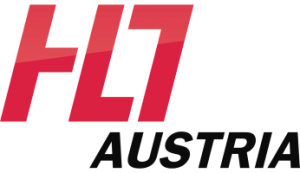Kurzbeschreibung der HL7-Standards
(1) Der Verein HL7 Austria erarbeitet Regeln für den Datenaustausch im Gesundheitswesen durch Festlegung von Standards im Bereich der elektronischen Datenverarbeitung – unter Verwendung von Originalstandards der Organisation „Health Level Seven® International“. Lesen sie mehr über die Nutzungsbedingungen und Lizenzinformationen
HL7 Version 2.x
Der HL7 Standard in der Version 2.x dient zur Übermittlung von Informationen zwischen Anwendungssystemen im Gesundheitswesen. Die Informationen werden als strukturierte Nachrichten ausgetauscht. HL7 V2.x ist weltweit der wichtigste und am häufigsten eingesetzte Nachrichtenstandard im Gesundheitswesen und wird ständig weiterentwickelt.
HL7 legt die Syntax dieser Nachrichten fest. Eine typische HL7-Nachricht besteht aus meheren unterschiedlichen Segmenten, die in fixe Felder gegliedert sind. Die Bedeutung der einzelnen Felder ist durch den Standard vorgegeben. Das Ereignis, das eine HL7-Nachricht auslöst, nennt sich Trigger Event, dieser Trigger Event bestimmt, wie die Struktur der Nachricht aufgebaut ist.
HL7 V2 XML: Nachrichten in Version 2.x könen auch in einem „Tagged Format“ auf Basis von XML codiert werden.
HL7 Version 3
Version 3 ist eine Familie von formalen Standards für Datentransfer und Interoperabilität.
Version 3 geht von einem generischen, konsistenten Datenmodell (RIM) aus, das mittlerweile als ISO Standard anerkannt ist. Auch das zu benutzende Vokabular ist streng definiert. Nachrichten und Dokumenten werden bei Version 3 wird in XML implementiert.
CDA
„Clinical Document Architecture“ (CDA) ist ein HL7-Standard der Version 3-Familie auf Basis von XML für den Austausch und gemeinsamen Gebrauch von medizinischen Dokumenten. Der Detaillierungsgrad kann nach Bedarf gewählt werden, CDA unterstützt optimal die automatisierte Auswertung der enthaltenen Daten. CDA wird bereits in vielen Ländern als Dokumentenstandard für elektronische Gesundheitsakten eingesetzt, auch ELGA) verwendet CDA.
Weitere HL7 Standards
- Arden Syntax zur formalen Wissensrepräsentation
- HL7 International Common Terminology Services (CTS2) definiert eine Schnittstelle zur Übertragung von Terminologien
- CCOW zur kontextsensitiven Kopplung von Desktop-Anwendungen
- Role-Based Access Control Healthcare Permission Catalog (RBAC)
FINDEN SIE DIE GEWÜNSCHEN STANDARDS NICHT? Informieren sie uns über das Kontaktformular oder schreiben sie an office@hl7.at
Wir sind verpflichtet, folgendes License Agreement zu veröffentlichen:
 LICENSE AGREEMENT
LICENSE AGREEMENT
Die aktuell gültige Policy wird auf der Website der Health Level Seven® International. veröffentlicht: http://www.hl7.org/legal/ippolicy.cfm?ref=nav
GOVERNING THE USE OF HL7® INTERNATIONAL STANDARDS AND INTELLECTUAL PROPERTY
Legal notice from Health Level Seven® International : The license agreement applies to HL7’s Intellectual Property, including standards, in Word, PDF, HTML, Access Database or other formats you have either purchased from Health Level Seven International (HL7®) or downloaded from the HL7 web site. These products are copyrighted by Health Level Seven International and are therefore protected by the Copyright Law of the United States and copyright provisions of various international treaties. Unlawful use of these products is strictly prohibited.
The right to use and distribute these products is restricted to HL7 members as follows:
CORPORATE/ORGANIZATIONAL MEMBERS are authorized to:
- reproduce and distribute all HL7 copyrighted Standards on an internal basis solely for use within their organization;
- reproduce and distribute excerpts of the Standard (not entire domains or chapters) to any customers; and,
- use HL7 standards in the development of software applications and messaging systems for direct use or distribution without additional licensing fees.
This authorization is provided if and only if:
- HL7 is clearly identified as publisher and holder of the copyright; and,
- any modifications of the excerpted Standards are clearly identified to end users.
Exclusions and prohibitions:
This authorization does not include direct commercial resale of the Standard(s) or excerpts or reproduction or direct incorporation of any part of the Access database for use in products for direct commercial resale.
INDIVIDUAL MEMBERS are authorized to:
- access the Standard(s) for their personal edification.
- engage in implementation services that do not include the distribution of or access to HL7 Standards or excerpts.
Exclusions and prohibitions:
Reproduction or distribution any HL7 copyrighted material without express written permission is prohibited. Further, individual members not associated with a corporate/organizational member are expressly prohibited from using the Standards in the development of software products specific to the exchange of healthcare information or the interoperability of such information and from reproducing or directly incorporating any part of the Access database in products for direct commercial resale. Such use is strictly prohibited and may be grounds for revocation of membership and additional legal actions.
Individual members are prohibited from engaging in implementation services that include the distribution of the HL7 Standards or providing client access to these specifications. Otherwise, individual members may provide the full spectrum of implementation services. The development and support of an „in house“ interface by an individual member is allowed and is not construed in the same sense as development of a commercial application.
NON-MEMBERS who have purchased the standard from HL7 are granted the right to:
- access (read) the Standards for their personal edification.
Exclusions and prohibitions:
Non-members have no rights to use, reproduce, or distribute the Standard(s), nor use them in the development of software products specific to the exchange of healthcare information or the interoperability of such information. Reproduction of any part of the Access database in products for internal use or direct commercial resale is strictly prohibited. In addition, non-members are strictly prohibited from engaging in implementation services.
ACCEPTANCE OF A LICENSE
Accessing the digital contents of the distribution package (such as a zip, Word or PDF file) constitutes acceptance of the terms of this license under applicable law.
